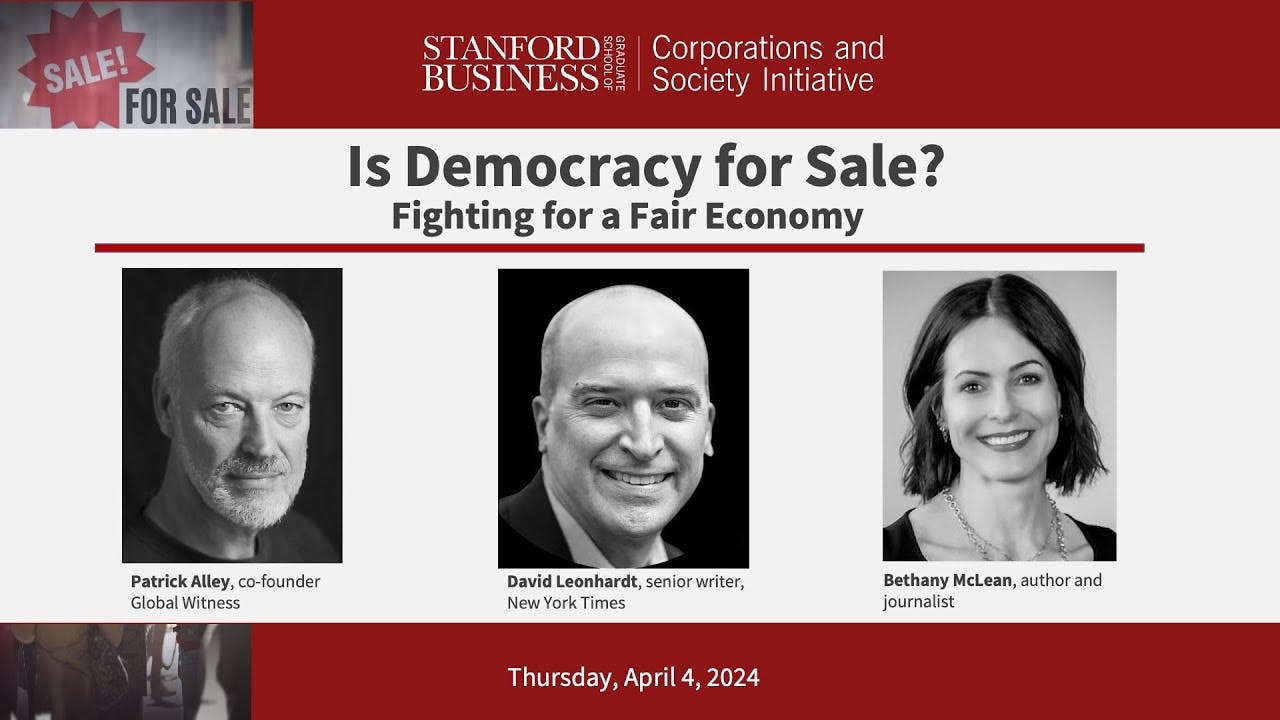Is Democracy for Sale? Fighting for a Fair Economy
()

Event Details
- The event is hosted by the Corporation Society Initiative (Cassie) at Stanford University's Graduate School of Business (GSB).
- The purpose of the event is to discuss the intersection of business, government, and society, with a focus on capitalism and democracy.
- The panel consists of Patrick Alley, David Leonhardt, and Bethany McLean.
Corruption and Democracy
- Patrick Alley emphasizes the links between environmental and human rights abuses and corruption.
- David Leonhardt stresses the need to examine the impact of economics on people's lives.
- Bethany McLean highlights the significance of corporate governance issues and responsible business practices.
Investigative Journalism and Systemic Corruption
- Patrick Radden Keefe discusses his journey to becoming an investigative journalist focused on corruption.
- Keefe introduces the concept of the "pinstripe army" and its role in facilitating corruption.
- He gives an example of investigating properties in London belonging to the secret police chief of Kazakhstan.
- Keefe emphasizes the importance of understanding the systemic nature of corruption and the role of enablers within the system.
The Pinstripe Army and Corporate Abuses
- The Pinstripe Army refers to a system that allows companies to abuse individual rights and engage in unethical practices legally.
- Keefe highlights the example of the Sackler family and Purdue Pharmaceuticals, who profited from opioid sales despite the societal damage.
Changes in Corporate Culture and Capitalism
- The culture in Corporate America has shifted towards self-seeking and less patriotic behavior.
- The transition from Democratic capitalism to Rough and Tumble capitalism has contributed to the decline of American democracy.
- The promises of Rough and Tumble capitalism have not been fulfilled, and it has not benefited everyone.
- The speaker proposes an alternative form of capitalism with more government involvement, regulation, and worker power.
Self-Regulation and Investigative Journalism
- Self-regulation by businesses has been ineffective in addressing sustainability, corruption, and climate change.
- Investigative journalism is crucial for uncovering corporate wrongdoings, and individuals should be contrarian and question the status quo.
- Admitting to not understanding something and digging deeper for understanding is a powerful tool for avoiding unethical situations.
Threats to Democracy and Potential Solutions
- The speaker expresses concern about the rise of corporatism, lobbyists' influence, and the decline in politician quality.
- They suggest political donation reform and lobbying reform to prevent democracy from being rigged.
- The speaker gives an example of private equity firms buying and selling hospitals, leaving taxpayers to clean up the mess.
- They emphasize the need for a change in corporate culture and accountability for executives' actions.
Addressing Societal Challenges
- The speaker discusses the potential for a Democratic crisis in the United States and the threat posed by China.
- They suggest that these challenges could lead to a renewed focus and unity, similar to the Cold War era.
- The speaker emphasizes the importance of addressing the imbalance of power between privileged and less privileged people.
- They propose a definition of capitalism where risk-taking is rewarded, and successful businesses benefit society.
- The speaker criticizes the current version of capitalism where people cause damage and still make fortunes.
Balancing Financial Incentives and Public Service
- The speaker discusses the issue of low salaries for politicians and suggests raising them to attract more competent people into public service.
- They acknowledge the complexity of balancing financial incentives and public service motivations.
- The speaker also highlights the problem of poorly paid civil servants in developing countries and its impact on corruption.